Expenses Every Doctor/Dentist in Retirement; A lot of physicians don’t really plan for their retirement because they see retirement as a financial finish line. Unfortunately, retirement is not the end of your financial expenses. The journey of your financial expenses does not stop in retirement. Retirement does have recurring expenses and you should be ready for these expenses.
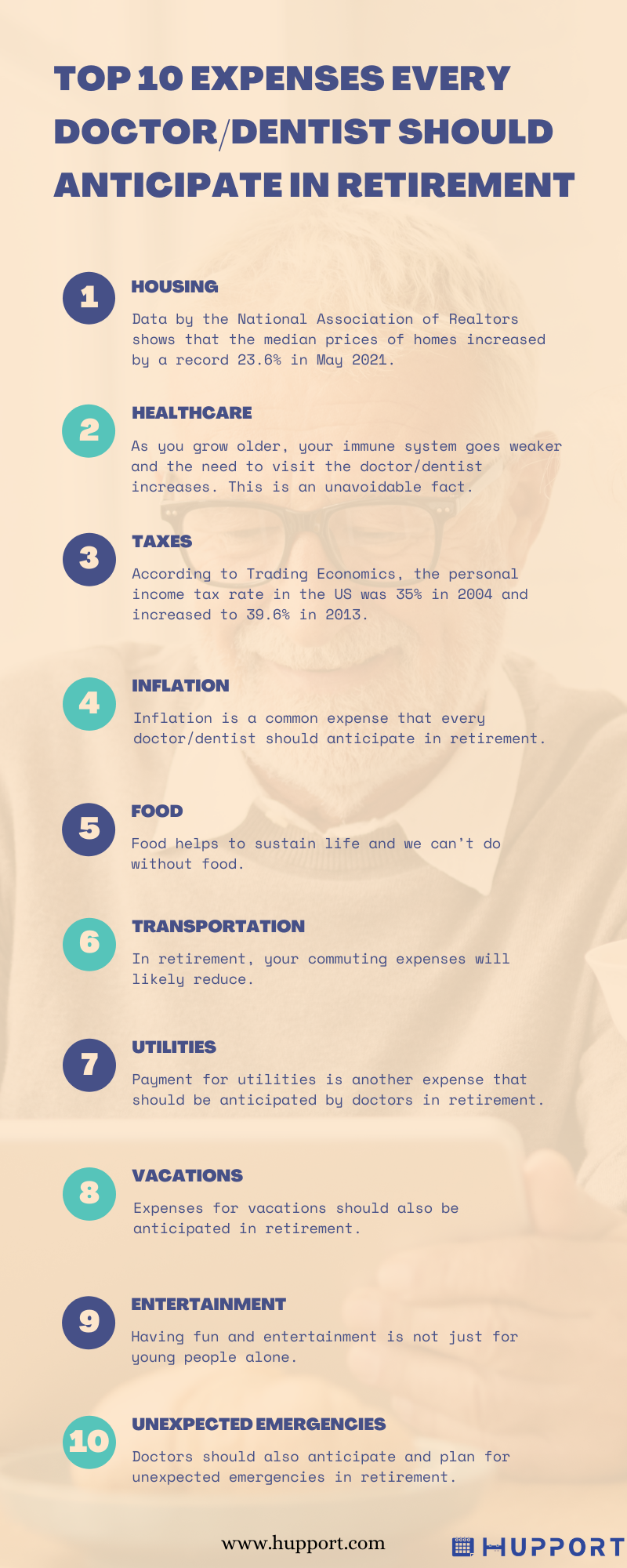
Expenses Every Doctor/Dentist Should Anticipate in Retirement
Below are some of the expenses that every doctor should plan for in retirement.
Housing
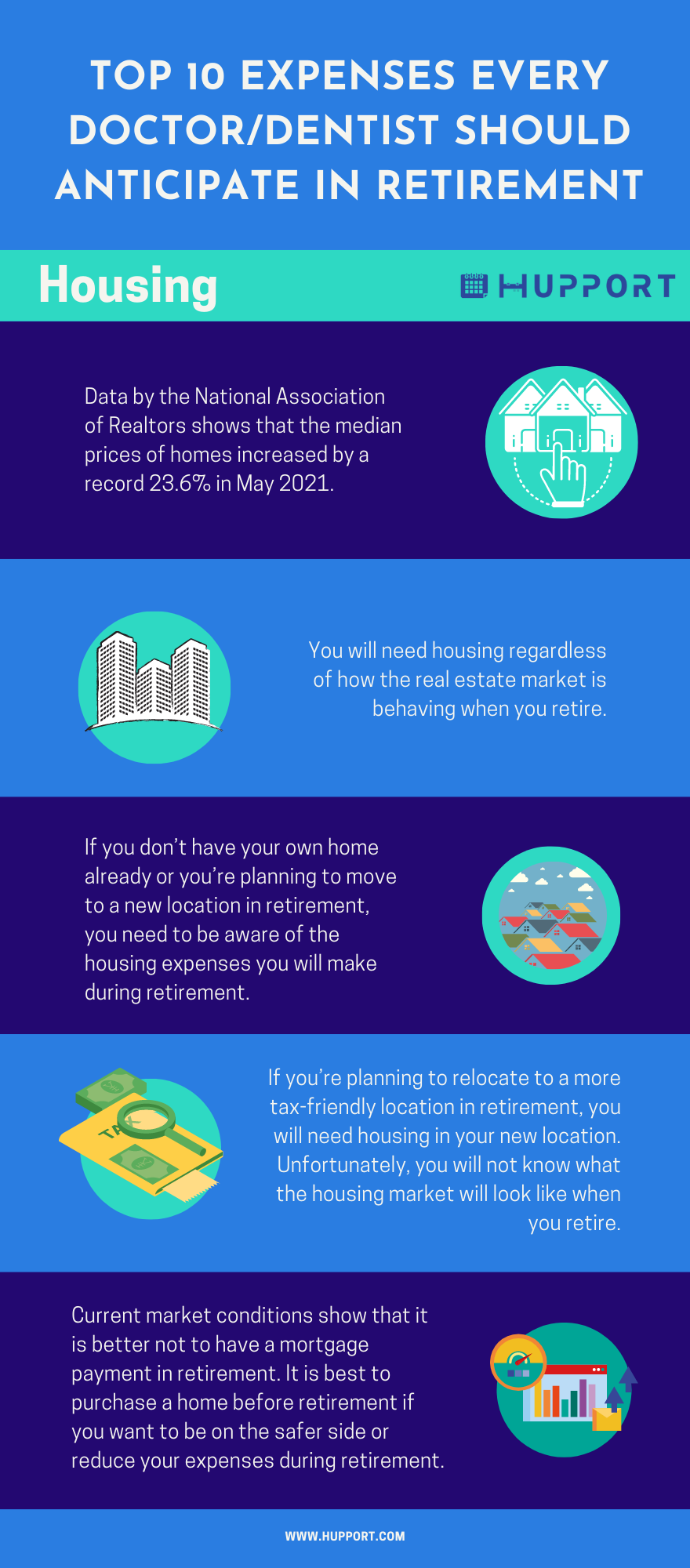
Housing
Data by the National Association of Realtors shows that the median prices of homes increased by a record 23.6% in May 2021. You will need housing regardless of how the real estate market is behaving when you retire.
If you don’t have your own home already or you’re planning to move to a new location in retirement, you need to be aware of the housing expenses you will make during retirement.
If you’re planning to relocate to a more tax-friendly location in retirement, you will need housing in your new location. Unfortunately, you will not know what the housing market will look like when you retire.
Current market conditions show that it is better not to have a mortgage payment in retirement. It is best to purchase a home before retirement if you want to be on the safer side or reduce your expenses during retirement.
Healthcare
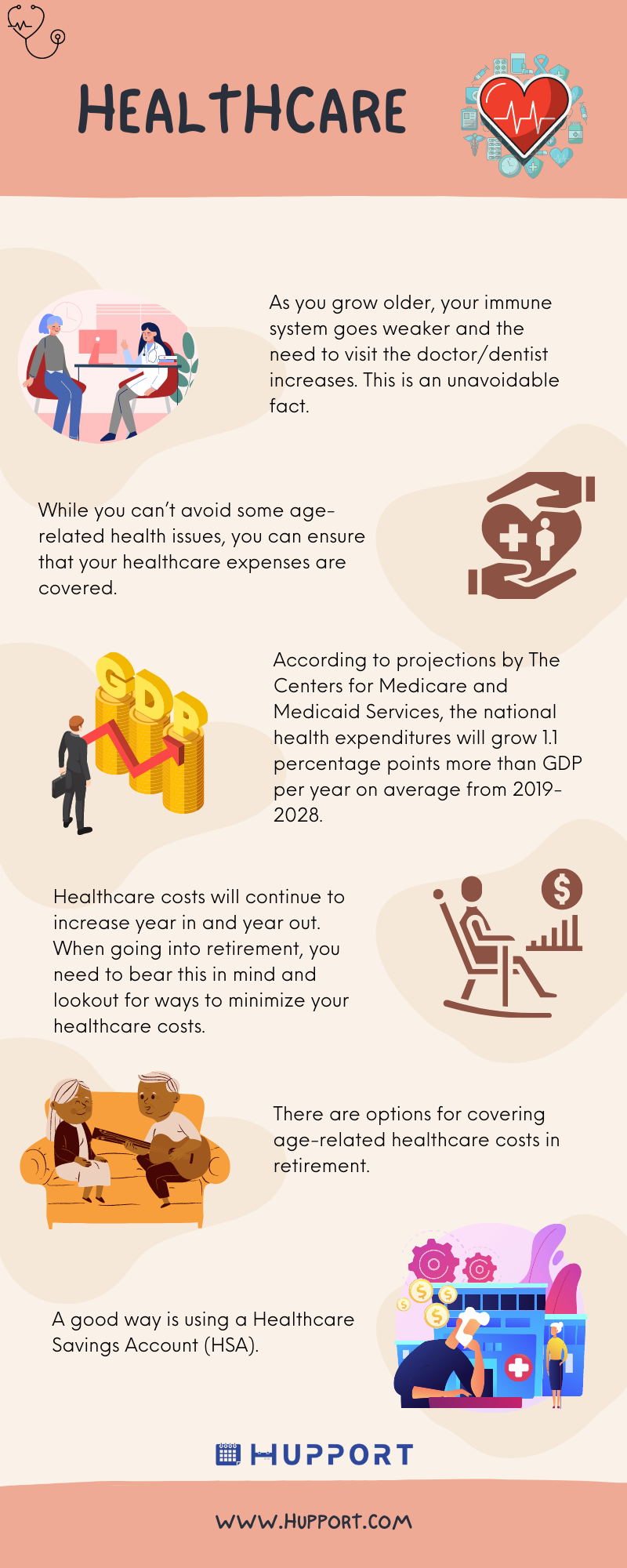
Healthcare
As you grow older, your immune system goes weaker and the need to visit the doctor/dentist increases. This is an unavoidable fact.
While you can’t avoid some age-related health issues, you can ensure that your healthcare expenses are covered. According to projections by The Centers for Medicare and Medicaid Services, the national health expenditures will grow 1.1 percentage points more than GDP per year on average from 2019-2028.
Healthcare costs will continue to increase year in and year out. When going into retirement, you need to bear this in mind and lookout for ways to minimize your healthcare costs. There are options for covering age-related healthcare costs in retirement. A good way is using a Healthcare Savings Account (HSA).
Taxes

Taxes
According to Trading Economics, the personal income tax rate in the US was 35% in 2004 and increased to 39.6% in 2013. In recent times, the personal income tax rate stands at 37%. This shows that tax is expected to increase as the years go by.
It is safe to say that doctors may likely pay more in income taxes in retirement than they do right now. This is a major expense that doctors should anticipate in retirement.
Generally, doctors tend to have better-than-average standards of living and they aim to maintain this standard of living in retirement. Income is generally fixed for retired doctors. Retired doctors make roughly the same amount of money every year. You also need to understand that expenses tend to go up, due to inflation and taxes while income remains steady during retirement.
Inflation
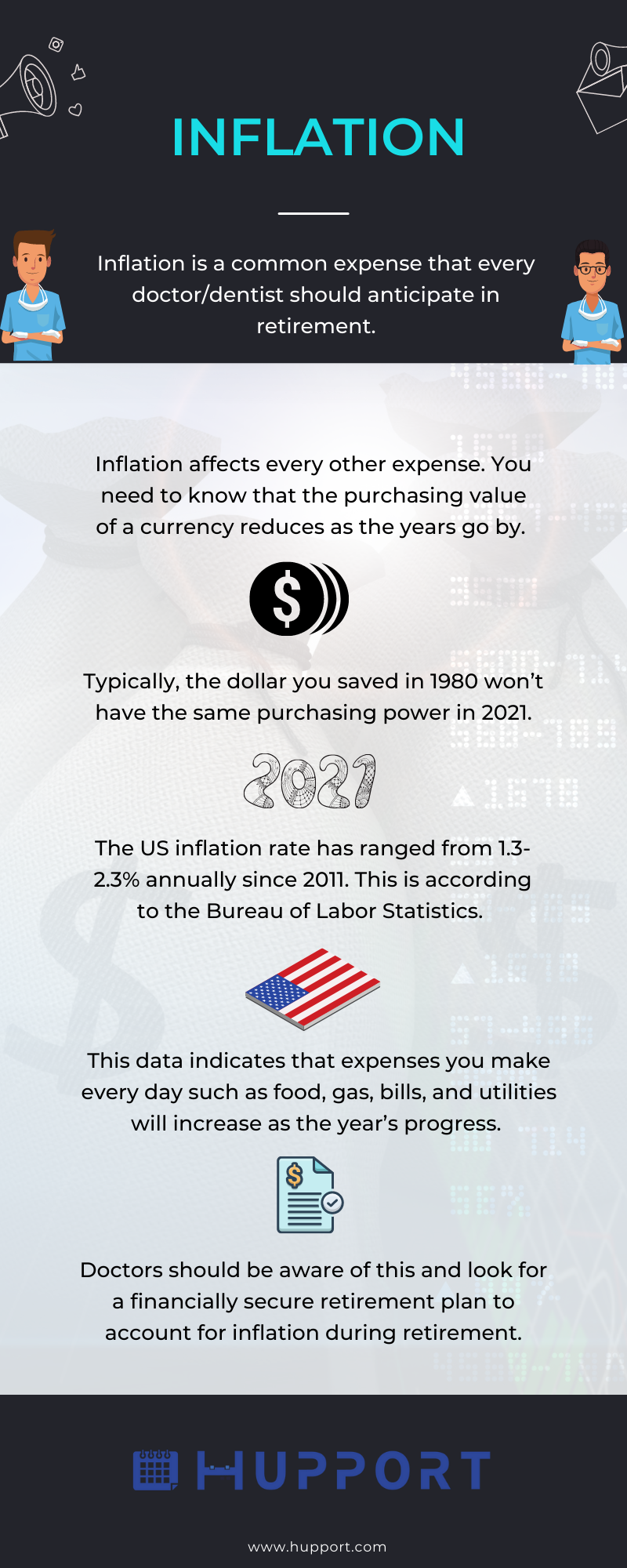
Inflation
Inflation is a common expense that every doctor/dentist should anticipate in retirement. Inflation affects every other expense. You need to know that the purchasing value of a currency reduces as the years go by. Typically, the dollar you saved in 1980 won’t have the same purchasing power in 2021.
The US inflation rate has ranged from 1.3-2.3% annually since 2011. This is according to the Bureau of Labor Statistics. This data indicates that expenses you make every day such as food, gas, bills, and utilities will increase as the year’s progress. Doctors should be aware of this and look for a financially secure retirement plan to account for inflation during retirement.
Food

Food
Food helps to sustain life and we can’t do without food. As a doctor, you should be aware that you will feed yourself and your family during retirement. Food category includes food items purchased to eat at home and also when dining out.
Data shows that retiree households spend an average of $6,599 on food. As a doctor planning for retirement, you should anticipate expenses for food.
There are some ways that you can use to reduce expenses for food. These include getting coupons to purchase groceries, making shopping lists, buying store brands, searching for stores that offer senior citizen discounts and using credit cards that offers strong cashback or point’s accumulation programs on groceries.
Transportation
In retirement, your commuting expenses will likely reduce. However, not all transportation expenses will reduce. Expenses such as gas, insurance, maintenance and repairs, car rental, leases and repayments will likely increase.
According to data, the average retiree household spends $7,492 a year on transportation. According to Transportation for America, almost 80% of seniors over the age of 65 live in car-dependent suburban and rural communities. This data suggests that retirees will require transportation during their retirement years.
To minimize transportation expenses, doctors that are planning for their retirement should have an auto insurance policy. They can also reduce expenses by using car hiring services such as Uber, Lyft, and so on.
Utilities
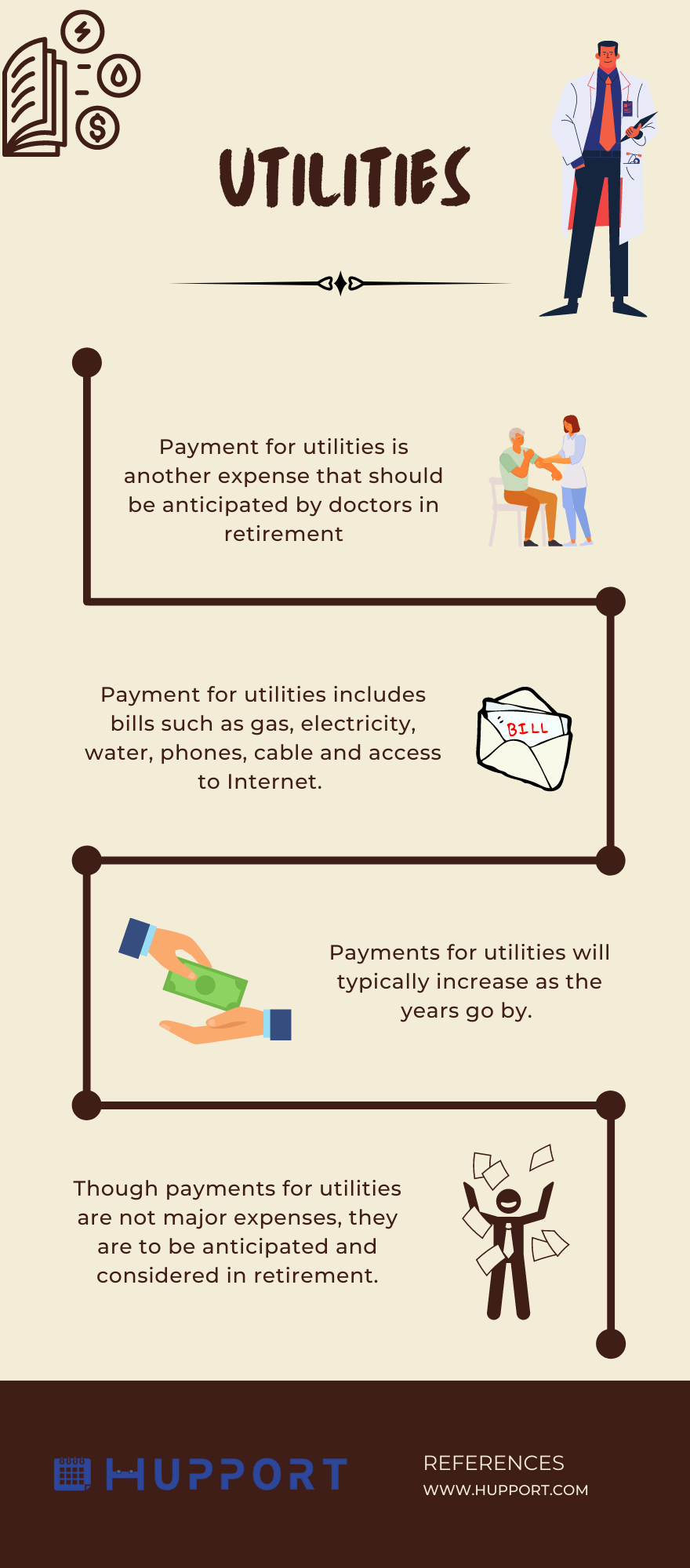
Utilities
Payment for utilities is another expense that should be anticipated by doctors in retirement. Payment for utilities includes bills such as gas, electricity, water, phones, cable and access to Internet. Payments for utilities will typically increase as the years go by. Though payments for utilities are not major expenses, they are to be anticipated and considered in retirement.
Vacations
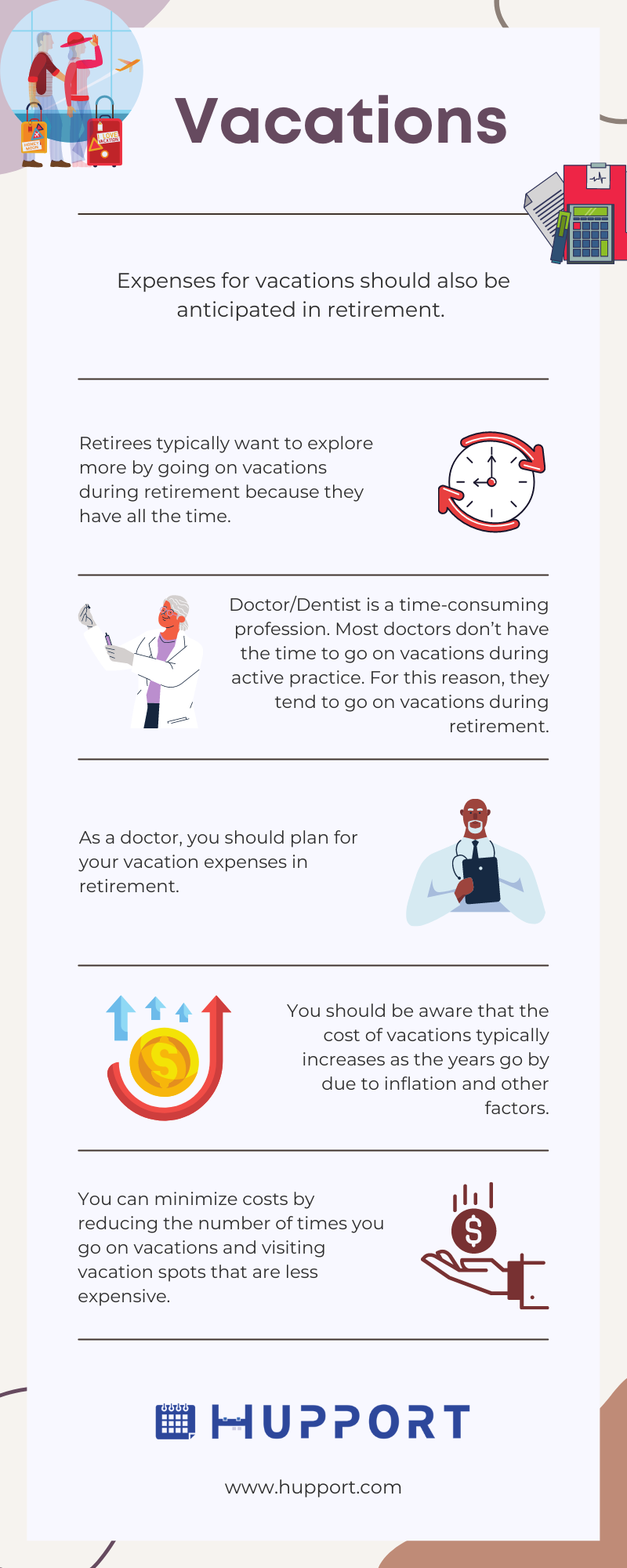
Vacations
Expenses for vacations should also be anticipated in retirement. Retirees typically want to explore more by going on vacations during retirement because they have all the time. Doctor/Dentist is a time-consuming profession. Most doctors don’t have the time to go on vacations during active practice. For this reason, they tend to go on vacations during retirement.
As a doctor, you should plan for your vacation expenses in retirement. You should be aware that the cost of vacations typically increases as the years go by due to inflation and other factors. You can minimize costs by reducing the number of times you go on vacations and visiting vacation spots that are less expensive.
Entertainment
Having fun and entertainment is not just for young people alone. Older people and retirees also need to have fun to keep body and soul together. People over the age of 65 spend an average of $2,282 annually on entertainment. They go to places like museums, theater performances and movies, malls, and parks for entertainment.
Retirees also buy pets for entertainment. They need to feed these pets and take them to vets when needed. All these are additional expenses that should be anticipated in retirement.
Unexpected emergencies
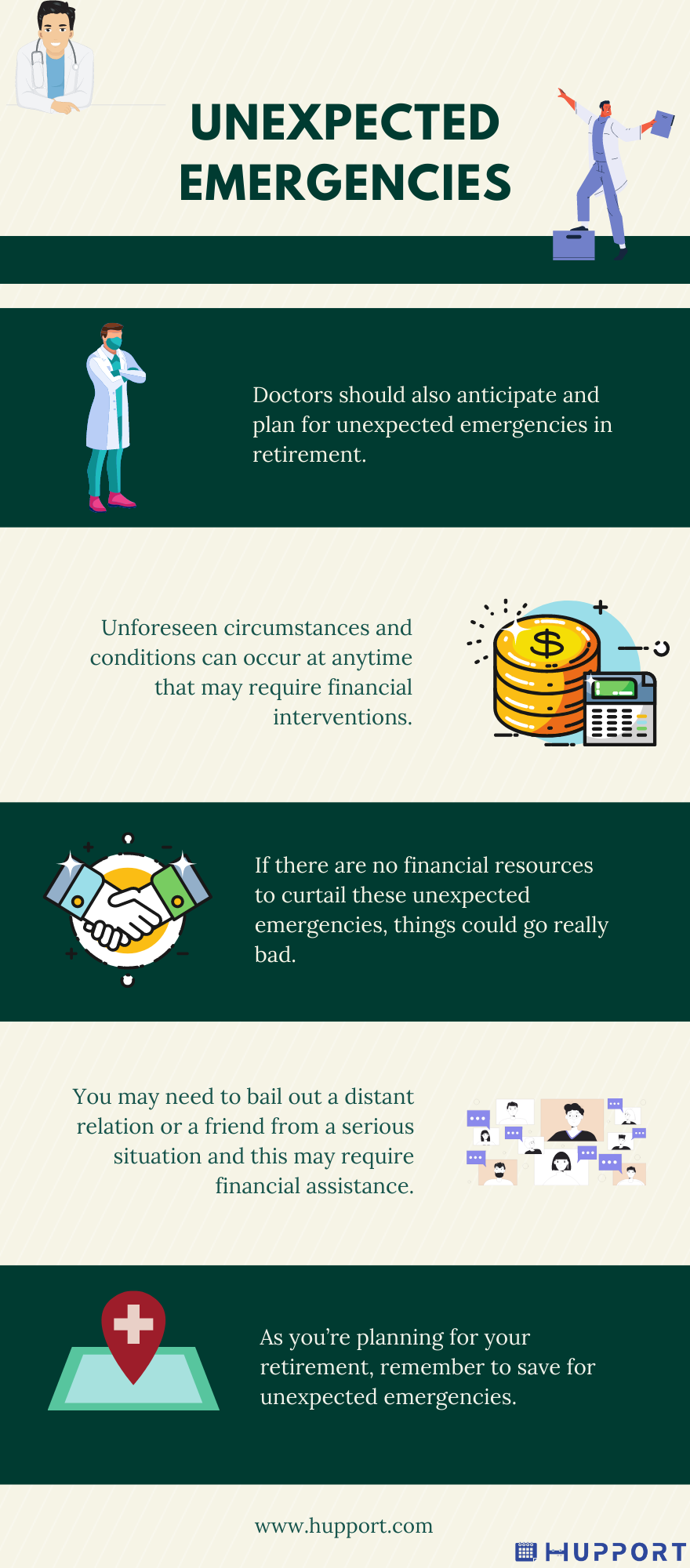
Unexpected emergencies
Doctors should also anticipate and plan for unexpected emergencies in retirement. Unforeseen circumstances and conditions can occur at anytime that may require financial interventions. If there are no financial resources to curtail these unexpected emergencies, things could go really bad.
You may need to bail out a distant relation or a friend from a serious situation and this may require financial assistance. As you’re planning for your retirement, remember to save for unexpected emergencies.
Conclusion
Budgeting for retirement can feel overwhelming, but taking it step by step at the right time allows you to create a retirement plan that will not put any financial burden on you. Start saving early towards your retirement to enjoy your retirement years.


